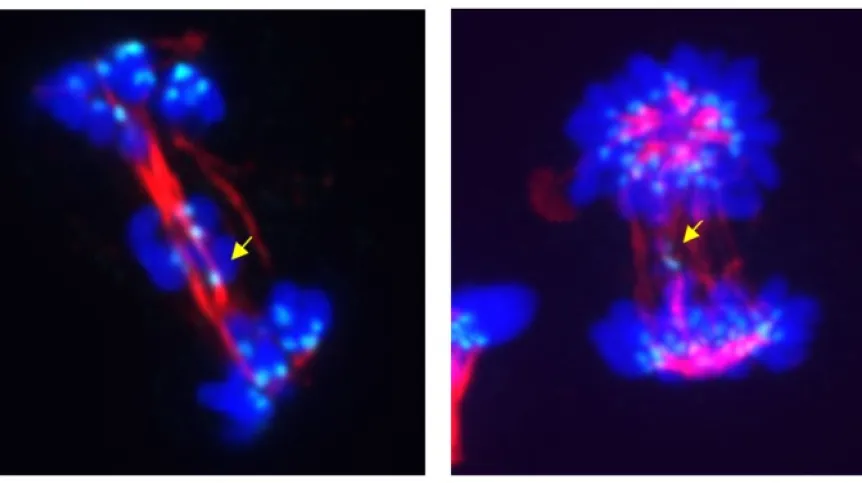
Mitosis, the process that leads to the creation of two identical daughter cells from one cell, is the foundation of life, growth and reproduction. It seemed that it was already a well-understood process. Meanwhile, another brick has been added to the knowledge about it.
Biology and medicine students will certainly be 'overjoyed' to hear that the process of mitosis has now been understood even more thoroughly and academic biology textbooks will need to be updated.
A team from several American centres (Dana-Farber Cancer Institute, Harvard Medical School, Fred Hutchinson Cancer Center, and Purdue University) has shown that an underestimated enzyme, cyclin-dependent kinase 5 (CDK5), plays a key role in cell division. A Polish researcher, Dr. Bartłomiej Tomasik from the Medical University of Gdańsk took part in the group's work. After many years of research, the team's work resulted in a paper recently published in the journal Nature.
A kinase unlike any other
CDK5 seemed to be a particular eccentric in the group of cyclin-dependent kinases, because it seemed to be... completely independent of cyclins. It interacted with other proteins, p35 and p39, and the name was given to it mainly because its structure resembled other kinases from the CDK group. So far, descriptions of CDK5's function have primarily concerned its activity in neurons, but the new results reveal a new, previously unknown face of this protein.
'Our results suggest that less typical CDKs - such as CDK5 - may also play a role in regulating the cell cycle. This discovery changes the existing dogma of molecular biology', Dr. Tomasik told PAP.
The results indicate that CDK5 deserves its name, because it is dependent on a certain cyclin. This cyclin is B1, the same mitotic cyclin that cooperates with CDK1, a key and well-described regulator of mitosis.
'We therefore introduced CDK5 into the CDK family as its full member', says Dr. Tomasik. He adds that CDK5 turns out to be a canonical kinase regulating the cell cycle, necessary for maintaining genome stability.
When mitosis goes wrong, or how to 'mess up' cell division
Scientists decided to investigate CDK5 because its overexpression was observed in cancer cells. It seemed that this protein performed functions primarily in the nervous system, in cells that no longer divided. For this reason, for years it had been ruled out that CDK5 had a significant connection with cell division. But the truth is that one protein can perform many functions.
The authors of the publication replaced native CDK5 with a variant specifically binding to substances that inhibit or degrade CDK5 before cells enter mitosis. Then they showed that cells in which CDK5 was turned off during mitosis (such 'miracles' are now possible in laboratories!) showed disorders in the work of the spindle apparatus.
The spindle apparatus is responsible for symmetrically dividing pairs of duplicated chromosomes between daughter cells. Blocking CDK5 resulted in, among other things, too many chromosomes in some daughter cells and too few in others. And this is a path leading the cell towards trouble.
Potential application in anticancer therapy
From the body's point of view, such chaos in healthy cells is a disaster that can lead to both cell death and the development of cancer, especially since the CDK5 protein is overexpressed in many cancers, and its excess is usually a bad sign for the patient. However, since CDK5 is so important for cancers and driving their division, it may also be the key to their destruction!
'Since the development of many cancers may depend on the level of CDK5, the use of CDK5 inhibitors appears to be a tempting form of therapy', says Dr. Tomasik.
In his opinion, it is worth conducting work on CDK5 inhibitors and testing how they will perform in the fight against cancer. Especially that inhibiting the activity of other cyclin-dependent kinases - CDK4/6 - is already successfully used in the treatment of breast cancer.
'CDK5 has not been taken into account so far, because its role in cell multiplication was not known. Now we know that this role is crucial. However, the road from basic research to clinically effective therapy is still long and bumpy, just like any scientific journey. That is why further research on CDK5 is necessary!' Dr. Tomasik says.
Dr. Tomasik is a physician specializing in cancer radiotherapy, and at the same time co-coordinator of a research team dealing with biological and physical aspects of ionising radiation and their translation into clinical practice. The group is actively seeking partners for further scientific activities.
PAP - Science in Poland, Ludwika Tomala
lt/ agt/ kap/
tr. RL













